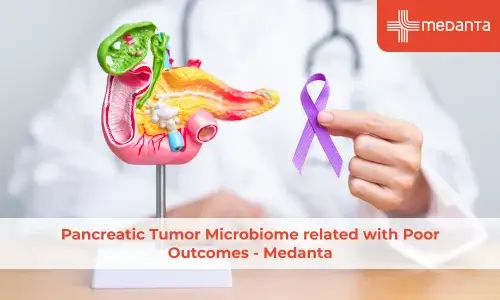Pancreatic Tumor Microbiome related with Poor Outcomes - Medanta

TABLE OF CONTENTS
Introduction
Due to its high aggressiveness and poor prognosis, pancreatic cancer (PC) is frequently recognized as one of the most lethal diseases. The most recent data show that PC’s 5-year overall survival rate has marginally increased but remains under 10%.
The diagnosis of PC and some rare characteristic symptoms are thought to be the main causes of high mortality near the time of incidence. Only 20% of patients with localized PC are eligible for the first resection, which remains the only treatment option. Due to these limitations, alternative medicines targeting early metastasis or recurrence are highlighted. However, treatment resistance reduces therapeutic efficacy and limits clinical value. Early diagnosis combined with effective treatment techniques is therefore crucial.
In several cancer types, including pancreatic ductal adenocarcinoma (PDAC), epithelial-mesenchymal transition (EMT) has been associated with the development of chemoresistance. EMT is a crucial step in metastasis that allows epithelial tumour cells to disperse to secondary sites after detaching from the primary tumour environment.
EMT is also linked to the development of cancer stem cell (CSC) traits, as it can be considered a dedifferentiation process. CSCs are undifferentiated cells crucial for tumour initiation and formation of differentiated cell clones due to their capacity for self-renewal and asymmetric cell division. CSCs are particularly responsive to precision therapies, making intratumor heterogeneity in PDAC an important factor in treatment response
Risk Factors
Additional environmental and metabolic stresses are likely necessary to fully explain the oncogenesis and progression of PC, as the primary oncogenic factor, mutant Kras, cannot do so alone. The role of bacterial infections in PC may be understated, even though recent research links the gut microbiome (GM) to increased relative risks of PC.
Chronic Pancreatitis
Chronic pancreatitis, characterized by localized or systemic inflammation, is another significant risk factor. A recently identified obesity-related disease, non-alcoholic fatty pancreatic disease, worsens pancreatic fatty degeneration and is linked to PC and chronic inflammation.
Patients with chronic pancreatitis frequently exhibit small intestinal bacterial overgrowth, with up to 92% showing this increase.
E. faecalis has been directly linked to chronic pancreatitis. Research suggests E. faecalis or LTA could exacerbate chronic pancreatitis, damage pancreatic tissue by inducing inflammatory cytokines, and potentially serve as PC biomarkers, though the relationship between subclinical chronic pancreatitis and PC remains unclear.

Obesity
Obesity significantly increases the risk of PC and lowers overall survival. Obese mice and humans exhibit less genetic diversity than their lean counterparts, affecting metabolic signaling pathways.
Microbiome changes: Increase in Firmicutes species and decrease in Bacteroides species.
Dysbiosis leads to low-grade inflammation, energy loss, and production of pro-carcinogenic microbial metabolites, which are linked to obesity and cancer risk.
Gut peptides also influence obesity and carcinogenesis.
Obesity and diabetes activate the innate immune system via NF-κB signaling, with circulating inflammatory factors including IL-1, IL-6, TNF-α, and monocyte chemoattractant protein-1.
Diabetes
Intestinal dysbiosis is linked to Type 2 Diabetes (T2DM). Stool metagenome analyses in T2DM patients show:
Increased Lactobacillus species
Decreased butyrate-producing Roseburia intestinalis and Faecalibacterium prausnitzii
Key findings:
Altered SCFA production affects diabetes risk and glucose metabolism.
Propionate production or absorption anomalies increase T2DM risk.
Butyrate elevations (host genetics-dependent) improve insulin response.
SCFAs may protect against Type 1 Diabetes (T1DM) by stimulating GPR-41 or GPR-43, which regulate gut peptides involved in nutrient absorption and glucose metabolism.
Further research is needed to clarify other microbial metabolic effects on diabetes.
Treatment for Pancreatic Cancer
Chemotherapy
Chemotherapy slows cancer growth and reduces tumour size, but chemoresistance and severe side effects remain major challenges.
Chemotherapy remains crucial, especially when combined with gut microbiome modulation.
Immunotherapy
Immune checkpoint inhibitors have gained attention, but improving their efficacy is critical due to multiple negative feedback pathways induced by resistance.
The gut microbiome (GM) is increasingly recognized as a modulator of immune responses in cancer patients.





